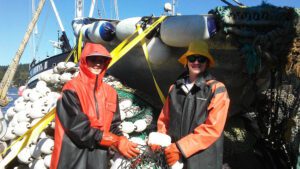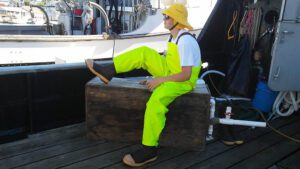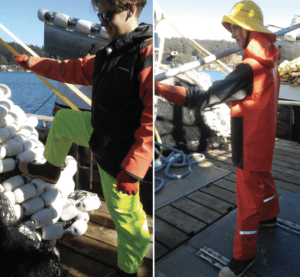
There they are on the television screen—images of flimsy little tents huddled together, flapping in the wind at Mount Everest’s base camp. One can’t help but wonder how these tiny, toy-like shelters can shield their occupants from the horrendous conditions on the Earth’s tallest mountain. The answer: technology.
The research and testing that goes into perfecting those tents protect the climbers from hypothermia. And likewise, the sports apparel industry has spent plenty of time crafting the gear that protects commercial fishermen from the ravages of the mighty seas.
Everything that fishermen wear, from head to toe, needs to fulfill the function of keeping them dry and comfortable. Commercial fishermen don’t wear puffy parkas—they need suits that repel water. They need to be able to perform their jobs—and that can be difficult if they’re drenched and miserable.
Keeping Warm and Dry
“You get so wet all the time,” fisherman Bowen Bratrud said. “It’s unbearable when you’re wet. Most days I have layers under my rain gear.”
Bratrud spent a good portion of his summer fishing near Valdez, Alaska and Washington State’s San Juan Islands.
He said that during breaks, he’d often have to change out of drenched clothing and put on fresh threads.
“You need seconds of everything; dry sweatshirts, socks … you do whatever you have to do to get through the day. If you’re sitting under the web, even on a sunny day, you still get soaking wet.”
Many fishermen wear a bib—a slick overall-type garment. Bratrud said, depending on how cold it is, he often wears sweatpants or sweatshirts under his bib.
“Whatever’s dry. It helps keeps everything in place. It keeps it (clothing) from coming out and getting wet.”
Veteran fisherman Jacob Babich can attest to the value of a good bib.
“If you don’t wear a bib, you get fish scales all over you and jellyfish will sting you,” he said.

Babich’s family has been in the fishing industry for generations. His father, Captain Mike Babich, said that he can tell when his son doesn’t put on the proper gear.
“I’ve seen him do that every once in a while,” the elder Babich remarked. “I instantly know because he’s soaking and covered with scales.”
This profession not only has to deal with what’s above—the sun, the wind and the rain—they also have to contend with what they’re pulling up from beneath their boat.
“Everything gets caught in the webbing,” Bratrud said. “The web is where you catch all the fish, and everything you pull from the ocean can fall on you. Jellyfish, eel grass and sticks fall on your head.”
When he first started fishing, Bratrud said, he wore a baseball cap to keep the sun out of his eyes. After losing a few of those overboard he opted for a heavy-duty fishing hat with a sturdy strap that fastens underneath the chin.
“It’s rubber. My thought process is to stay dry. No one wants to wear a soaking hat,” he said. “There’s times I would see jellyfish hanging from my hat—it would get on my mouth, my nose—everywhere if you don’t wear a hat.”
Some fishermen wear a rainproof gator to keep falling surprises off of their faces.
On top of their bibs—or pants, if they choose to wear them—fishing jackets help to ward off the wind and ocean spray. Some are equipped with hoods that the wearer can flip over their heads for extra protection against flying debris.
“With a jacket you could get soaked and you still stay pretty dry,” Bratrud said. “I have a jacket with a big hood—it’s almost like a built-in hat—all the stuff would catch on the hood and fall (to the deck).”
“And you have to zip it up,” he added. “If you didn’t zip up you might have jellyfish get inside.”
Mike Babich said his favorite improvement to modern rain gear is a jacket with a neoprene cuff, made from the same material scuba divers wear, sewn onto the bottom of the sleeve.
“It cups onto the bottom of your arm and keeps the water from going up,” he explained. “They’re great. I can’t even fish without them. They’re the greatest (innovation) to the coat they’ve made in 10 years.”

Don’t Forget the Hands and Feet
Accessories worn on the extremities during a fishing expedition are of utmost importance.
“The gloves help you grip onto things,” Jacob Babich said. “I like to wear gloves that have a giant extension all the way up to your armpit.”
Bratrud admitted that on his first trip, veteran fishermen chided him for wearing gloves, a notion he dismissed fairly quickly.
“The first couple days I didn’t wear gloves and when you’re inside the net you’re always grabbing things,” he said. “With the gloves it stops water from getting up your sleeves.”
Bibs or pants, gloves or no gloves, many professional fishermen agree that one item is absolutely essential—a good pair of waterproof boots.
Bratrud said it’s important to get boots that have insoles.
“That’s huge. You need insoles because you’re standing all day,” he said. “My boots are insulated and it’s super nice. My feet are always warm. With insulation the toe in the boot is a little harder. That’s good because if I dropped something on my foot it wouldn’t get crushed as much.”
“Jacob Babich said he never leaves his boots behind.
“It’s really windy and rainy in Alaska and (with boots) it’s 10 times better for your feet,” he explained.
Mike Babich said that 99.9% of commercial fishermen wear Xtratuff boots because they have a smooth tread, whereas other boots usually have a thick tread that can snag on the netting.
“You can go to a hardware store and buy those, but most guys don’t wear them because all you do is catch net, and you’re constantly tripping on stuff,” he remarked.
Whatever a fisherman chooses to wear, Bratrud says it needs to fit well.
“Make sure it’s on tight,” he said. “It’s not a fashion show.”
